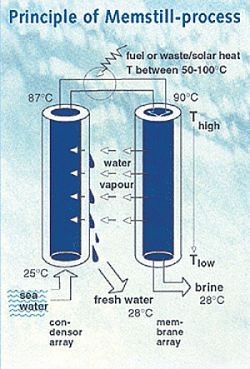Golden Age Technologies
Purest, Cheapest and Environmentally Friendliest
|
 |
Our planet is 70% covered with water. Still there is a drinking water shortage, due to the fact that only 2.5% of this water is drinkable and the largest part of that water is ice. That's why the Dutch organization T.N.O. (Netherlands Organization for Applied Scientific Research) developed a technology to transform the other 97.5% of unusable sea water into drinking water.
The existing methods that do the same thing are not very cost-effective. So T.N.O. developed a new technology called Memstill that uses very little energy to change polluted water and seawater into the clearest drinking water. Memstill is the cheapest and environment friendliest of them all. The technology uses ‘rest warmth of engines’, a source of energy which is present in all industrialized countries. Therefore Memstill is very interesting because the process is driven by the little changes in temperature which don't consume much energy. T.N.O. did some small pilot-projects to test the technology. They were successful, so now they are busy with a bigger project for the Singapore Water Company "Public Utility Board" where they filter 1000 liters of sea water per hour into a very high quality drinking water. The cost of the water purification on a large scale, like in Singapore, using the free energy from industrial rest warmth, is about 30 eurocent per 1000 liters. And in the Netherlands, it cost from 10 to 20 eurocent to purify 1000 liters of groundwater and from 50 to 60 eurocent to purify 1000 liters of surface water.
Another advantage for using the Memstill technology is that it does not contribute to the production of greenhouse gasses. Therefore they save another 2 eurocent per 1000 liters.
With the prediction that the world
population in the next 20 years will grow by 50% and the quantity of
drinking water, in the same time, will diminish, the future for cheap
water treatment technology looks very promising. At the moment there
are 3 million households in the U.S.A. with water treatment units to
purify the water from disinfecting agents like chlorine. In Texas, California
and Florida water companies are beginning to purify seawater, but with
the more expensive methods mentioned before. Now that countries are
looking for cheaper technology to make drinking water, the future looks
bright for Memstill. ![]()